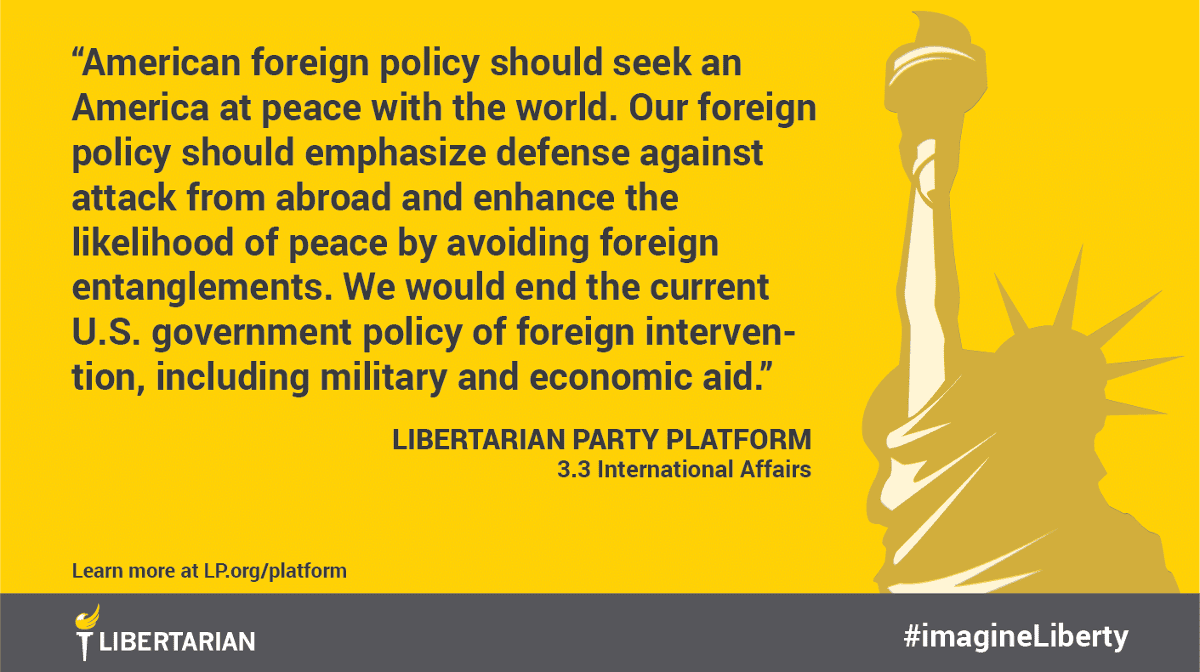In a speech in Miami on Feb. 18, President Donald Trump addressed the ongoing humanitarian crisis in Venezuela. He correctly pointed out that the people of Venezuela are afflicted by the malady of tyrannical socialism, a sociopolitical disease introduced by deceased President Hugo Chavez and now incubated by President Nicholas Maduro. Despite getting the diagnosis right, Trump doesn’t understand the cure when he suggests that “All options are on the table” for potential U.S. intervention.
“Trump has demonstrated a remarkable ability to be both right and utterly wrong in the same speech,” said Libertarian National Committee Chair Nicholas Sarwark. “He is correct that socialism has completely destroyed the economy of what was once the most prosperous country in South America. Socialism has also squelched production from the largest oil reserve in the world. Trump is terribly misguided, however, in thinking that U.S. intervention will solve Venezuela’s economic crisis, whether in the form of economic sanctions, public threats, or military action. The specter of U.S. intervention will only allow Maduro to shift the blame for his country’s problems away from his own misbegotten policies.”
This renewed U.S. interest in Venezuela has largely been spurred by the rise of Juan Guaidó, leader of the now largely powerless Venezuelan National Assembly, which claimed Maduro’s reelection was illegitimate and then appointed Guaidó as the “interim president” until fair elections could be held. The United States now recognizes Guaidó as the rightful president of Venezuela, but the Maduro regime has retained the support of Russia and China.
During his remarks, Trump threatened Maduro’s supporters in the Venezuelan military by hinting that the United States knows where they’ve stored their money. He indicated that the generals can either abandon support for Maduro and keep their money in peace, or lose it all and face retribution if they do not. Interventionist plots to force regime changes have a long history of failing and backfiring, though. Ultimately, nothing works better to bring about real change than open and honest trade.
“Peace, commerce, and honest friendship with all nations — entangling alliances with none,” Sarwark said. “Thomas Jefferson’s prescription for successful international relations remains good advice to this day. Wherever we have followed it, we have been successful in improving the lives of ordinary people in other countries, along with the people in our own country, through mutually beneficial trade.”
After losing the war in Vietnam, the United States began trading freely with the people there, enriching both countries simultaneously. After the Cold War ended, China, Russia, and the countries in formerly communist Eastern Europe all became valuable trading partners. Despite ongoing political oppression in some of these countries, their market reforms have led to dramatic improvements in standards of living for the people there.
We’ve maintained hostile relationships with other countries, though, like Cuba, Iran, and other Midddle Eastern countries, and the opposite has held true for them. Animosity and economic boycotts have not only failed to bring about regime change, they have devastated the lives of ordinary people.
The gravest danger would be to foment a global war with by staging a military attack on a regime that has the support of countries that can return attack. Trump is right when his gut tells him that the United States should withdraw from its military interventions in Syria and Afghanistan, but he is gut-wrenchingly wrong when he advocates new military adventurism in South America.
“It is not our role to impose any electoral outcome on Venezuelans,” Sarwark said. “The United States succeeds when it leads by example: Engaging in free trade, ensuring freedom and liberty for our own citizens, and offering that freedom and liberty to others by making immigration easy and accessible. The talented and oppressed people of Venezuela, Nicaragua, Cuba, and elsewhere should be allowed to build homes, families, and careers within the relative freedom of America. Their presence here expands our own economy and enriches our culture.”
Although the United States has a much stronger culture of freedom than socialist countries like Venezuela, political leaders on both sides of the aisle are trying to change that.
On the left, we see increasingly popular calls for “democratic socialism” from congressional newcomers like Democratic Rep. Alexandria Ocasio-Cortez and long-time veterans like Sen. Bernie Sanders, who has just officially announced he plans to seek the U.S. presidency in 2020. They demonize free trade, advocate massive new forms of spending and taxes, and announce utopian schemes to force the entire economy into their egalitarian mold. Following their advice would set the United States down the same road that led to Venezuela’s downfall.
On the right, any pretense of conservative principle has fallen victim to Trump’s destructive populism. Just like the left, the right now demonizes free trade and embraces the same forms of protectionism that have been discredited since the age of Adam Smith. Republicans pass record-high federal budgets and call for enormous new spending programs in their xenophobic attempts to keep immigrants away — immigrants that would improve the economy if only they were allowed to work and trade in peace. No matter how much Trump claims to oppose socialism, the policies he supports would lead the United States down a similar road of authoritarian control.
“Only the Libertarian Party recognizes that free trade and individual liberty are the real solutions to the problems that face us and all other countries,” Sarwark said. “Prosperity arises from the bottom up. It can’t be imposed from the top down.”

